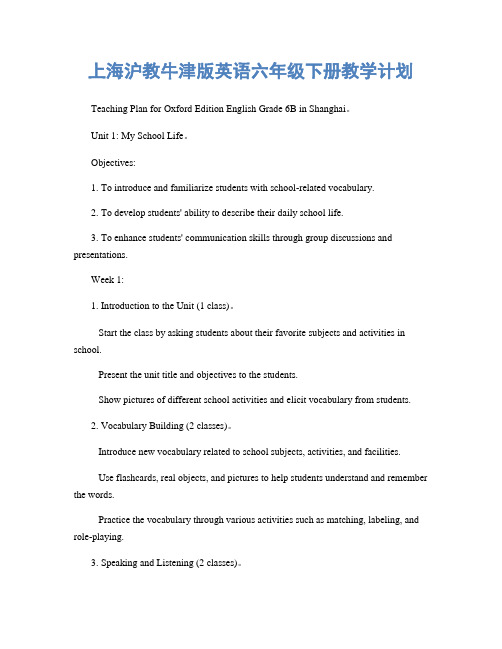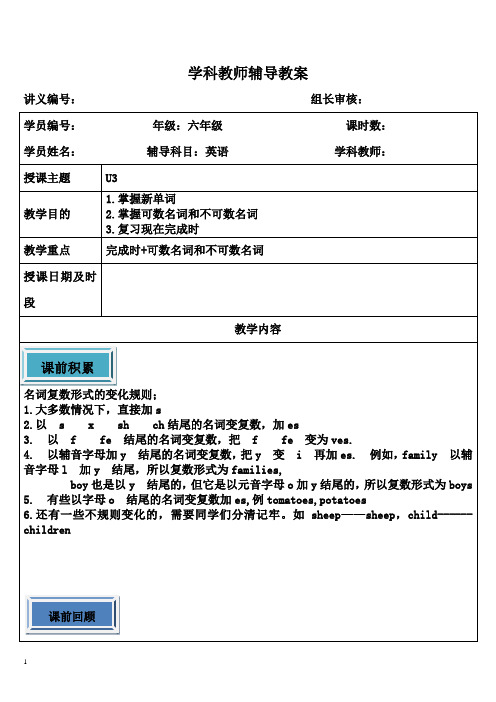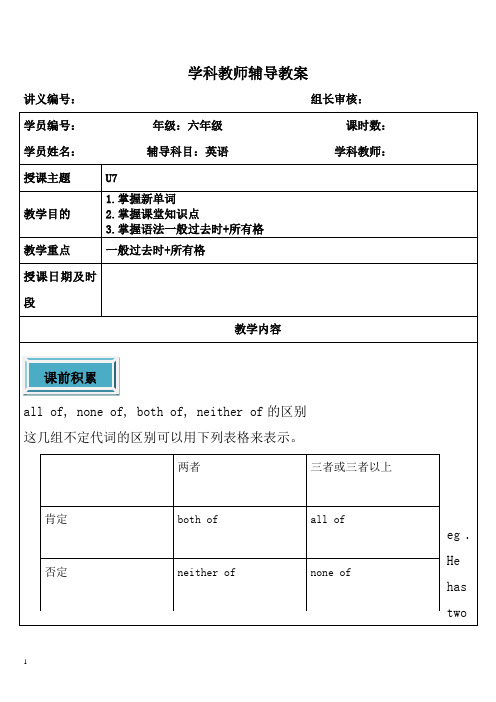2017-2018学年牛津上海版英语六年级下册全册教案
【沪教牛津版(三起)】六年级下册英语教案

⑴Fred and Doris smiledat each other.
⑵We are poor ,but we are happy.
⑶I wish you a happy life.
Step Three:Read the story again
Step Four:Complete the sentences on page 11
教学重、难点
Words: weight kilogramcentimetrefan theater
Sentences: How old are you ?I’m ... centimetres tall. How much do you weigh ?I weigh ... Kilograms
教学准备
Phrases: each other, once upon a time , wish you a happy life
教学用具
Recorder
教学过程
Step One:Review
Step Two:A story
1. Read a story one time
2. Guessing “three wishes” (三个愿望)
Countryside:a lot of houses, rivers ,hills and lakes
Walk or ride bicycles
Plant crops in spring, in autumn, nbsp;crops in
Unit 2 Changes in our livesPeriod one
There are two.
5. ---do you weigh ?
上海六年级牛津英语下册教案范文集锦

上海六年级牛津英语下册教案范文集锦一、Module1Unit1"WeleBacktoSchool"【教学目标】1.让学生掌握本课的生词和短语,如"weleback","classmate","teacher"等。
2.让学生能够用英语进行简单的自我介绍和询问同学的情况。
3.培养学生热爱学校的情感,增强班级凝聚力。
【教学重点】1.生词和短语的掌握。
2.询问同学情况的表达方式。
【教学难点】1.询问同学情况的表达方式。
【教学过程】Step1:导入1.教师用图片展示学校场景,引导学生说出相关的单词。
2.学生自由谈论他们在学校的生活。
Step2:新课展示1.教师播放课文录音,让学生听懂课文大意。
2.教师通过提问,帮助学生理解课文内容。
Step3:课堂活动1.学生两人一组,用英语进行自我介绍和询问同学情况。
2.教师选取几组进行展示,给予评价和指导。
Step4:课堂小结2.学生分享他们在课堂活动中的收获。
【作业】1.复习本课的生词和短语。
2.编写一段对话,用英语介绍自己和询问同学的情况。
二、Module2Unit2"MyFavouriteSeason"【教学目标】1.让学生掌握本课的生词和短语,如"season","favourite","cold","hot"等。
2.让学生能够用英语描述自己最喜欢的季节及原因。
3.培养学生热爱自然、关注季节变化的能力。
【教学重点】1.生词和短语的掌握。
2.描述季节及原因的表达方式。
【教学难点】1.描述季节及原因的表达方式。
【教学过程】Step1:导入1.教师展示四季的图片,引导学生说出相关的单词。
2.学生自由谈论他们最喜欢的季节。
Step2:新课展示1.教师播放课文录音,让学生听懂课文大意。
2.教师通过提问,帮助学生理解课文内容。
2018牛津上海版六下Unit 5《What will I be like》word教案1

2018牛津上海版六下Unit 5《What will I belike》word教案1单元分析(Unit Analysis)(一)单元地位(Unit Position)1 本课中重点学习了“He/She/You will be____ centimeters taller./___ _____ kilogrammes heavier.”“He/She/You will be____ and_____.”“H e’ll/She’ll/You’ll possibly be a/an _____.”等使用一样今后时来叙述今后事实的句型.一样今后时在前面的课文中差不多学过,但在课文中增加了与现在的一个比较,还要进一步的进行巩固性操练。
2 be good at sth/doing sth 的用法在本册书本Module One, Unit Three 的课文中显现过,在本单元中大量使用,同时新增了反义词组be poor at st h/ doing sth 的使用. 教师可通过咨询题化设计,让学生进行操练并把握.3 用First, Next, Then, Finally等副词来表示时刻顺序在6A中被介绍使用过,在本课中让学生进一步巩固复习。
4 在本单元中涉及的有关工作的词汇,建议以旧带新,在复习的基础上把握新的内容。
(二)单元目标(Unit Target)1 运用情态动词have to来表示在客观要求下不得不做某事。
如I have to practise English and Chinese more. / I have to learn to make sick pe ople better.2 运用固定表达Yes, I agree. /No, I don’t agree. 来表达意见。
如P eter will possibly be a policeman. Yes, I agree. /No, I don’t agree. I thi nk he’ll possibly be a fireman.3 操练有关今后外貌、喜好、职业的各种提咨询和对话。
上海沪教牛津版英语六年级下册教学计划

上海沪教牛津版英语六年级下册教学计划Teaching Plan for Oxford Edition English Grade 6B in Shanghai。
Unit 1: My School Life。
Objectives:1. To introduce and familiarize students with school-related vocabulary.2. To develop students' ability to describe their daily school life.3. To enhance students' communication skills through group discussions and presentations.Week 1:1. Introduction to the Unit (1 class)。
Start the class by asking students about their favorite subjects and activities in school.Present the unit title and objectives to the students.Show pictures of different school activities and elicit vocabulary from students.2. Vocabulary Building (2 classes)。
Introduce new vocabulary related to school subjects, activities, and facilities.Use flashcards, real objects, and pictures to help students understand and remember the words.Practice the vocabulary through various activities such as matching, labeling, and role-playing.3. Speaking and Listening (2 classes)。
牛津上海版六年级下册U1教案

(2)所属关系:A is in the north of B.
(3)两地接壤:A is on the north of B.
P3 by+交通工具 表示乘....(交通工具),用 How 提问
1. How far is it from Shanghai to Beijing?从北京到上海有多远?
3
How far... 多远。询问距离的远近,路程的长远。
read → reading 读 talk → talking 谈 话 ep---sleeping
speak---speaking
2. 不发音的-e 结尾的动词去掉 e 后再加-ing:
smile → smiling 微 笑 move → moving write → writing 写 wake---waking
2.How long does it take to travel from Shanghai to Beijing by
train?
坐火车从上海到北京要多久?
(1)How long...多久。询问时间长短。(对 for/about+一段时间提问)
(2) How long…多长。用于询物的问长度。
3.How soon will you go back? 你要多久回来 How soon 多久 ,询问时间长短 (对 in+一段时间提问) from...to...从...到... Half an hour one and a half hours=one/an hour and a half 一个
A. What B. Which C. Where D. This
( ) 3. Russia is ___________ China.
牛津上海版六年级下册U3教案

学科教师辅导教案讲义编号:组长审核:Lose 失去 lose memory 失忆 lose one’s way 迷路 lose one’s eyesight失去视力 lose one’s job 失业danger n.危险 be in danger 处于危险中 dangerous adj.危险的 ---反义词 safe Remember v. 记得 memory n.记忆力 remember to do sth 记得去做某事(未做)Remember doing sth 记得做过某事(已做) forget to do sth 忘记去做某事(未做)Forget doing sth 忘记做过某事(已做)Would rather do sth than do sth 宁愿做某事不愿做...Send sth to sb =send sb sth 寄给某人某物2.讲解课文P14-P17 would like to do sth =want to do sth 想要做....Thousand 千表示具体数量不加s two thousand 表示成千上万加s thousands of One’s job is to do sth 某人的工作是去做.... listen to sb 听某人的话The fifth day of the fifth lunar month of that year 农历五月初五Rice dumplings with meat 肉粽 rice dumplings without meat 不加肉的粽子Ones 一些 one 一个 a piece of 一片作文:Spring festival 传统节日:春节The Spring Festival is coming. I will help my mother clean the windows and wash the clothes. I will put on duilian on the door and chuanghua on the window.People usually go home to spend the festival with their family. They have a big family get together. The Chinese people have big meals and watch TV during the Spring Festival. They also visit their friends and relatives.The underlined part means “________”.A. AboutB. Less thanC. OverD.little( ) 7. Ben’s mother is not at home. He _________ look after his younger sister.A. has toB. have toC. need toD. must to ( ) 8. I don’t like coffee ____________ sugar. It’s too sweet.A. withB. withoutC. hasD. /( ) 9. --Where is your brother? -- He __________ to the library.A. has goneB. has beenC. goesD. went( ) 10. Bangkok is _________ of Shanghai.A. south-westB. to the west-southC. west-southD. in the south west ( ) 11. I spent____________ making this model plane.A. a half and an hourB. one and a half hoursC. one and a half hourD. an and half hours( ) 12. My father’s job is ___________ sick people better.A. makeB. makingC. to makeD. makes( ) 13. It’s too hot outside. I’d rather not _______ out!A. goB. goingC. to goD. goes( ) 14. There are many skirts in the shop. Do you like this red ________?A. oneB. onesC. one’sD. once( ) 15. --Would you like ______ orange juice? -- _______________.A. any … No, thanksB. some … Of courseC. some … Yes, pleaseD. an … No, thanks。
牛津上海版六年级下册U5教案

学科教师辅导教案讲义编号:组长审核:1. 单词讲解:Possible adj.可能的 possibly adv.可能地=perhaps=maybeFuture 未来 in the future 在将来(用于一般将来时) in future 从今以后In front of 在..前面(不包含在内) in the front of 在...前部(包含在内)Magic adj.魔法的 magician n.魔法师 magical adj. 魔法的Look for 寻找(强调动作) find 找到(强调结果) find out 查明(根据线索)Search 研究(针对某处所,容器或人进行搜索找到想找到的人或物,一般与for 连用)Press 压 --近义词 push ---反义词 pull 拉 weigh v.称重 weight n.重量High adj.高的 height n.高度 kilogram 千克 gram 克Beautiful pretty good-looking handsome的区别:这四个单词都有“漂亮的,好看的”意思,beautiful和pretty 常常用于形容女性,但beautiful的语义比较强,handsome 通常用于形容男性,而good-looking往往男性女性都可形容。
Reporter n.记者 report v.报告 Baker n.面包师 bake v.烘烤 bakery n.面包房Agree v.同意---(反义词)disagree 不同意 agree on sth 对...意见一致Agree to do sth 同意做.... agree to sth 赞同.... agree with sth 赞同 ... Agree with sb.同意某人的观点 be good at sth/doing sth 擅长做....Be poor/weak at/in sth/doing sth 不擅长做.... be good to...对...友好Be good for... 对...有好处 grow v.长大 grow up 长大A lot 在句中可作主语、宾语、或状语,也可以用来修饰比较级加强语气2.讲解课文:P33-P37 take a photograph照相wait for the red light等待红灯。
上海六年级牛津英语下册教案范文集锦

上海六年级牛津英语下册教案范文集锦全面贯彻“三个面向”战略指导思想,渗透和灌输可持续发展的战略思想。
以素质教育为根本宗旨,以培养创新精神和实践能力为重点,充分发挥学生的潜能,提高学生的全面素质和自学能力。
那么在学习英语的过程中有哪些教案会比较好呢?以下是小编带来的上海六年级牛津英语下册教案内容,感谢您的阅读,希望能帮助到您!上海六年级牛津英语下册教案1Unit 1 Who is younger?一、语音:ir字母组合在单词中的发音 /E:/二、单词和习惯用语: (共21个)四会单词和习惯用语(9个):young年轻的 go for a walk 去散步 glad 高兴的,乐意的as…as 和……一样 tall高的 than比 short短的、矮的 strong 强壮的 heavy 重的三会单词(10个):chat聊天 light轻的 sit(sat)坐 meet(met)遇见、见面 twin (双胞胎)之一 as作为 minute分钟 only惟一的、仅有的 child孩子(children 孩子们)centimeter 厘米二会单词(2个): height身高 weight体重三、词组:1.on Sunday morning 在星期天早晨2.go for a walk 去散步3. look the same 看起来一样4.as tall as 与…..一样高 as fat as 与…..一样胖as long as 与….一样长5. shorter than 比….矮bigger than比大heavier than比重6. twenty minutes younger小二十分钟7.one year older大一岁9.be glad to do 非常高兴做某事10.a twin sister 双胞胎姐妹11.how old 多大12.the only child 仅有的一个孩子13.a tall boy 一个高个子的男孩14.a young teacher 一位年轻的教师15.some heavy boxes 一些重的盒子16.your old friend(s)你的老朋友17.a strong goalkeeper 一个强壮的守门员18.the girl in red 穿红衣服的女孩19.yours or mine 你的还是我的20.look young 看起来年轻21.have a chat 聊天、闲谈四、形容词比较级:A.直接加er/rtall---________light----________young--_________old---________strong--___ small--_________late---_________long---_________short--________ nice--- _____B.双写加erbig-------_________ fat-----_________ thin---________ hot---________C.去y改i加erheavy---_________ early---__________ busy---__________D不规则good---_______ many---________ much---______ bad/ill ---_____ little---_______五、句型:1、A+谓语(be动词)+形容词比较级+than +B A比B……Who’s younger than him ? 谁比他年轻?My brother is younger than him . 我弟弟比他年轻。
牛津上海版六年级下册U9教案

fixing a dripping tap. We can take a shower instead of a bath. We mustn’t brush your teeth under a running tap. We promise not to play water games.
课前回顾
检查上节课作业
复习比较级和最高级变化形式
1
新课讲授
1. 讲解新单词: Competition n.竞赛 be in competition with sb for sth 为...和某人竞争 Compete v.竞争 stream n.小河 lake n.湖泊 river n.河流 sea n.大海 pool n. 泳池 pond n.池塘 intelligent adj.聪明的 intelligence n.聪明 important adj. 重要的 importance n.重点 cover 覆盖 discover 发现 take a shower 淋雨 Have a bath 洗澡 fix=repair v.修理 turn off=switch off 关 turn on=switch on 开 2. 讲解课文:P62-P67
three quarters/ a quarter 四分之三/四分之一 prepare v.准备 prepare for ....为...做准备=get ready for Almost 几乎=nearly on the earth 在地球上 on earth 究竟 one of the+最高级+名词复数 最....之一 dangerous adj.危险的 danger n.危险 Be in danger 处于危险中 interesting adj.令人感兴趣的 interested adj.感兴趣的 Be interested in sth/doing sth =be fond of=be keen on 对....感兴趣 also 也(放句中,主 语后)too 也(肯定句句尾)either 也(否定句句尾) get....from...从哪里得到某物 Use v.使用 use A to do B 使用 A 做 B =A be used to do B used to do sth 过去常常做某 事 Be/get used to doing sth 习惯做某事 in the deep sea 在深海 be important to sb 对某人 是重要的 keep sb/sth +adj 保持某人或某物是....样的 keep sb doing sth 一直让某人做 某事 stop v.停止 stop sb to do sth 停下来去做另一件事 stop sb doing sth 停止做某
六年级英语下册 6B Module1 Unit4(5)教案 沪教牛津版

position:The Earth.
Stop doing 为本课时重点,须多做操练。
说说做做练练中,让学生掌握关键句型。
听力练习,综合所学知识,进一步巩固本单元,并进一步培养听力能力。
4 Display the posters in the class or in a public-access area of the school.
1.Photocopiable page 96
2.Grammar Practice Book 6B pages 14,15 and16
1. Read and recite the text.
复习巩固,为新授做准备
先教授单词,同时带出难词难句。
While-task pctivities
Assignment
1.Exercise
Photocopiable page 28,
2. make posters
1.Now listen!
Read and write.
Which is wider?
What are the stars like in the sky?
Read and recite the poems.
Look at the moon and stars at night. What can you see?
1 Introduce: water pollution, land pollution, killing, skins.
2 Circulate and provide help to students.
3 Invite a representative of each group to come forward and talk about their poster. Elicit class opinion on the poster and the message.
牛津上海版六年级下册U7教案

两者
三者或三者以上
肯定
both of
all of
否定
neither ofo
pens . Both of them are blue . 他有两支钢笔。两支都是蓝色的。(be 动词用复数) Neither of the two pencils is his.这两支铅笔都不是他的。(be 动词用 单 All of his classmates like him.他的同学都喜欢他。(be 动词用复数) He lives in a large family and none of them wears glasses. 他生活在一个大家庭里,家里没有人戴眼镜。(be 动词用单数)
A. Both
B. All C. Most
D. None
( ) 6. Are you going to Canada ______ ship?
A. by B. with
C. for
D. in
( ) 7. I would rather ______ at home.
A. not stay
B. not to stay
underground stations and flyovers but fewer traffic jams. I believe travelling in
Shanghai will be much more convenient.
课堂小结
记忆时间,自己理一理: 梳理课堂知识点
课堂练习
4
Ⅰ. 默写 1. 一辆双层巴士_____________ 2. 一个投币箱_______________ 3. 一辆空调巴士______________ 4. 一张公交卡_______________ 5. 一位公交车售票员__________ 6. 乘轮船/乘地铁_____________ 7. 交通堵塞__________________ 8. 所有的/大部分的/一些的/没有的 ___________________________ 9. 十年以后_________________ 10.在过去____________________ 11. 不得不__________________ 12.花园城市的交通___________ 13.更多的人行道____________ 14.更少的交通堵塞____________ 15.更少的交通______________ 16.乘地铁_________________
2018年下学期牛津上海版英语六年级下册全册教案

2018年下学期牛津上海版英语六年级下册全册教案Unit 1 Great cities in Asia一、单元分析(Unit Analysis)(一)单元地位(Unit Position)1 本课中出现了较多的特殊疑问句,用来询问。
询问方式,如How are we going to get to…?询问做某事花费时间的长度,如How long does it take?询问距离,如How far is it from … to …?询问方位,如Where…?这些问句及其答句,教师有必要在课堂教学中加以一定的机械性训练。
2在6A的同名模块中,学生已学习过How…? / How long…? 等特殊疑问句的表达方式。
已学习了用It takes sb. some time to do sth.的句型来回答做某事花费某人多少时间。
本unit中增加了疑问句“How far…?”。
建议温故知新,加以区分疑问词的意思及答句的不同方式。
3教授east, south, west, north四个方位,建议用指南针图表形式复习并学习其他四个方向,如north-east, south-east, south-west, north-west.4情态动词shall的用法在本课中多次出现,在课本中也为首次出现。
课文中主要结合旅行的方式提问。
教师可以设计多个场景,穿插各种不同的事物让学生进行操练。
5What …?/Which…?的句型最初在6A中就已出现。
本课中用来表示询问相关信息。
(二)单元目标(Unit Target)1 运用How far…?/ How long…?来询问距离及做某事花费时间的长度,并学会用It isabout…kilometers./It takes about…minutes.句式来回答。
2 掌握V+doing. 如love eating/enjoy swimming.3 操练有关How/Wh-的各种提问及其回答。
- 1、下载文档前请自行甄别文档内容的完整性,平台不提供额外的编辑、内容补充、找答案等附加服务。
- 2、"仅部分预览"的文档,不可在线预览部分如存在完整性等问题,可反馈申请退款(可完整预览的文档不适用该条件!)。
- 3、如文档侵犯您的权益,请联系客服反馈,我们会尽快为您处理(人工客服工作时间:9:00-18:30)。
Unit 1 Great cities in Asia
一、单元分析(Unit Analysis)
(一)单元地位(Unit Position)
1 本课中出现了较多的特殊疑问句,用来询问。
询问方式,如How are we going to get to,?
询问做某事花费时间的长度,如How long does it take?
询问距离,如How far is it from , to ,?
询问方位,如Where,?
这些问句及其答句,教师有必要在课堂教学中加以一定的机械性训练。
2在6A的同名模块中,学生已学习过How,? / How long,? 等特殊疑问句的表达方式。
已学习了用It takes sb. some time to do sth.的句型来回答做某事花费某人多少时间。
本unit中增加了疑问句“How far,?”。
建议温故知新,加以区分疑问词的意思及答句的不同方式。
3教授east, south, west, north四个方位,建议用指南针图表形式复习并学习其他四个方向,如north-east, south-east, south-west, north-west.
4情态动词shall的用法在本课中多次出现,在课本中也为首次出现。
课文中主要结合旅行的方式提问。
教师可以设计多个场景,穿插各种不同的事物让学生进行操练。
5What ,?/Which,?的句型最初在6A中就已出现。
本课中用来表示询问相关信息。
(二)单元目标(Unit Target)
1 运用How far,?/ How long,?来询问距离及做某事花费时间的长度,并学会用It is
about,kilometers./It takes about,minutes.句式来回答。
2 掌握V+doing. 如love eating/enjoy swimming.
3 操练有关How/Wh-的各种提问及其回答。
(三)单元重点(Unit Points)
1 关键词:
1)国名、城市名:Asia, Beijing, China, Tokyo, Japan, Bangkok, Thailand
2)旅游展览相关词汇:exhibition, explore, pier, harbour, tunnel, midtown, route, international, capital, tourist, sightseeing, travel
3)方位:east, south, west, north, north-east, south-east, south-west,。
